How Fort Wayne’s community gardens are growing more sustainable, connected neighborhoods
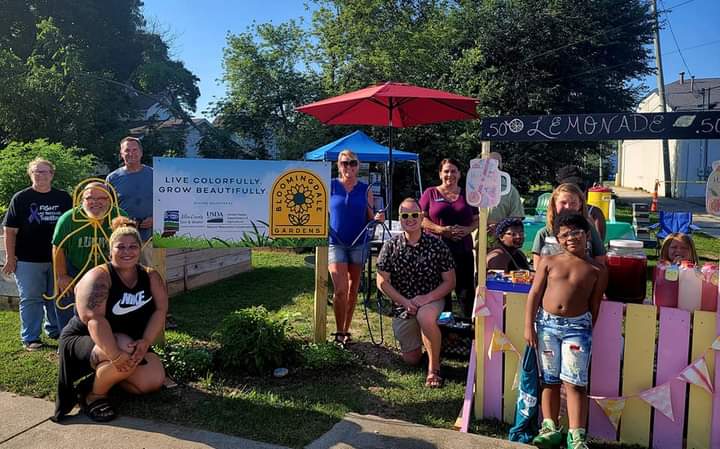
As rent, groceries and the cost of living rise, many residents near Downtown Fort Wayne are turning to community gardens to supplement their weekly meals.
“Our garden is used every day by neighbors here,” says Chris Walker, President of the Bloomingdale neighborhood, just north of Downtown along the Wells Street Corridor. “There’s somebody here at least four times a day. Food prices have increased, and we’re in a food desert where there are not a lot of healthy, affordable options.”
Walker considers Bloomingdale one of Downtown’s few affordable neighborhoods left, on the brink of ever-expanding riverfront development nearby. As property values rise, the garden’s free food is increasingly critical to its residents. But more than meals, community gardens across the city are providing neighborhoods ways to connect, educate youth, and enjoy nature near the urban core.
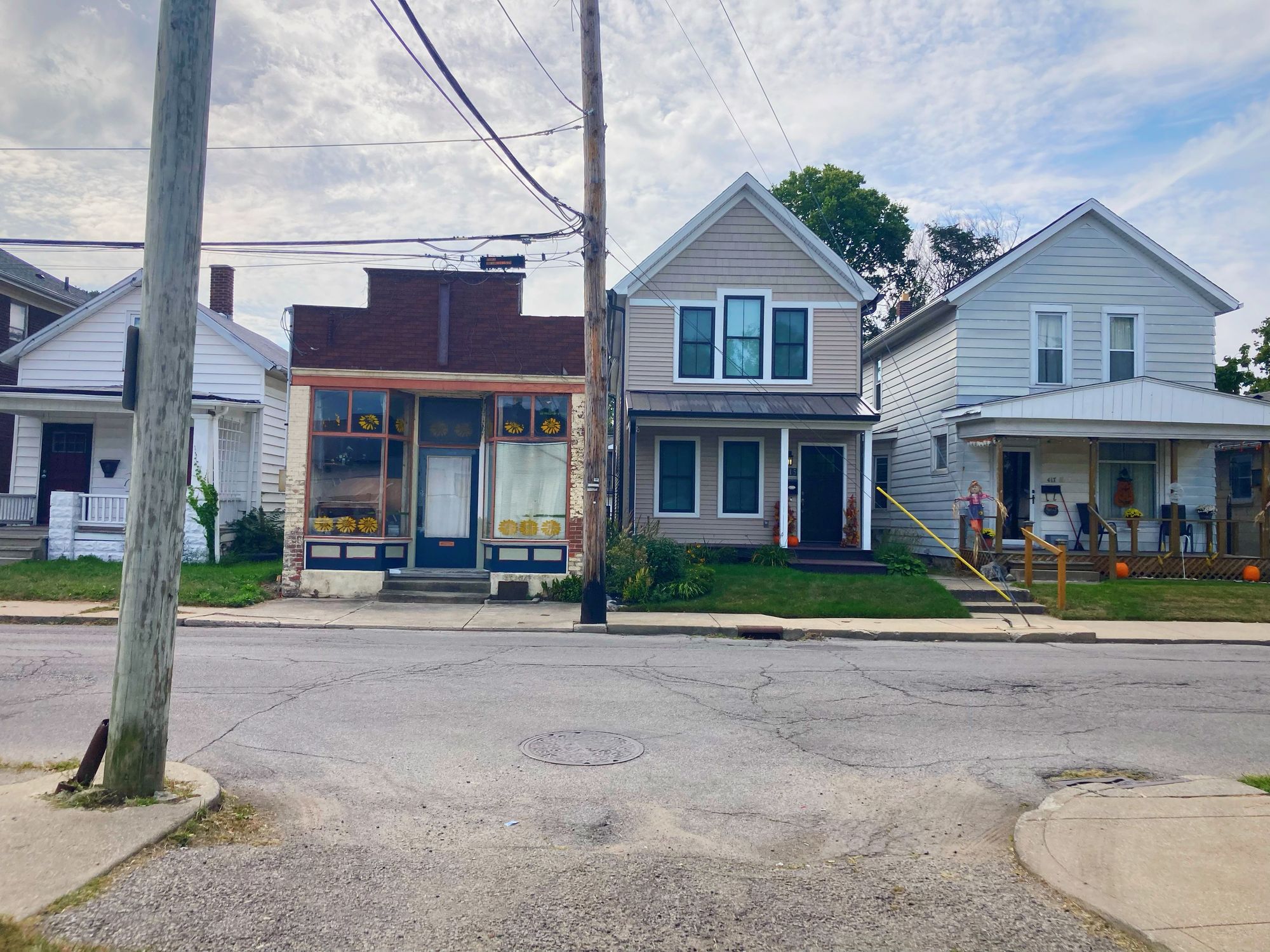
These are a few of the many reasons Walker and his wife, Vonda, purchased and expanded the 54-by-83-foot Bloomingdale Gardens near their home at 420 High St. in the spring of 2021. The project began about seven years prior when an organization called the Plentiful Earth Foundation in Winchester, Ohio, originally purchased the land to support food access.
In 2018, the garden changed hands to Phillipe and Samantha Arney of Young Urban Homesteaders, who sold it to the Walkers. With the help of grants from Associated Churches and the Allen County Soil and Water Conservation District, the Walkers have combined the garden with an adjacent lot and enhanced it into a full-fledged urban demonstration farm for conservation practices, like crop rotation, with six raised garden beds, educational signage, a food pantry and more.
Today, the garden is maintained by a combination of dedicated neighborhood volunteers as well as area students and organizations. It grows both annual and perennial plants, ranging from blackberries and persimmons to indigenous Pawpaw trees and heritage and heirloom items, like Gaspé flint corn grown by the Micmacs (a Northeast Native American Tribe) and Mexican sour cucumbers.
“Growing culturally significant food is also very important to us because Bloomingdale has a large Hispanic community,” Walker says. “We are also probably one of the only community gardens in our area to routinely plant cover crops to preserve the soil health of our garden.”
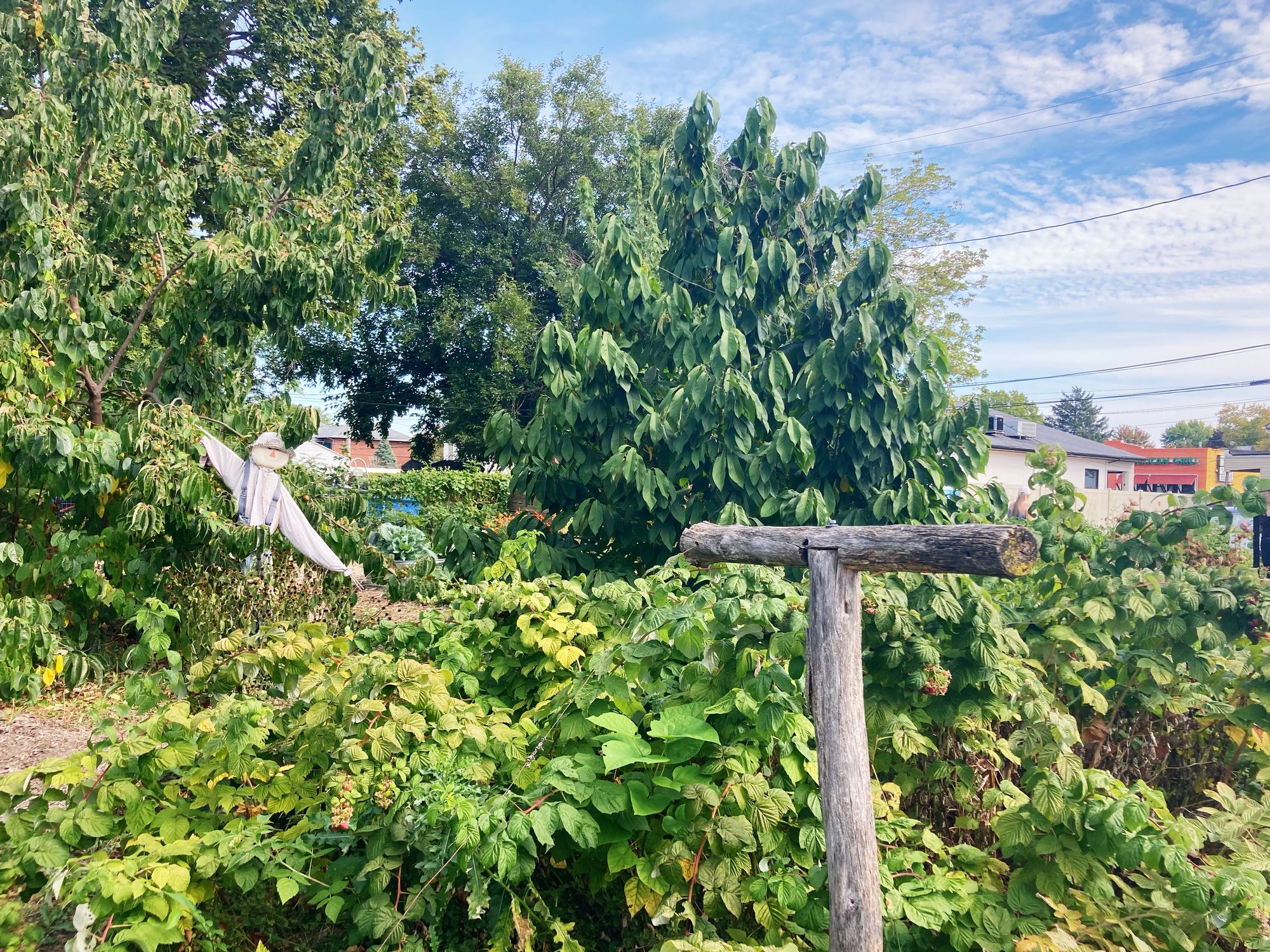
Seeds for the garden are donated by neighbors, the Purdue Extension Office, and the Allen County Soil and Water Conservation District, or collected from the garden to reuse. The food is free for anyone to harvest anytime, Walker says. It is also donated to Trinity United Methodist Church.
On a recent Thursday morning in late-September, Pencey and his roommates stopped by to gather armfuls of leafy green kale at Bloomingdale Gardens. They plan to freeze it to make soup this winter.
“I’ve rented a house close to here for about four months now, and I come to Bloomingdale Gardens not quite once a week, but probably every two weeks,” Pencey says. “It's really a wonderful source of free food, but also beauty and education.”
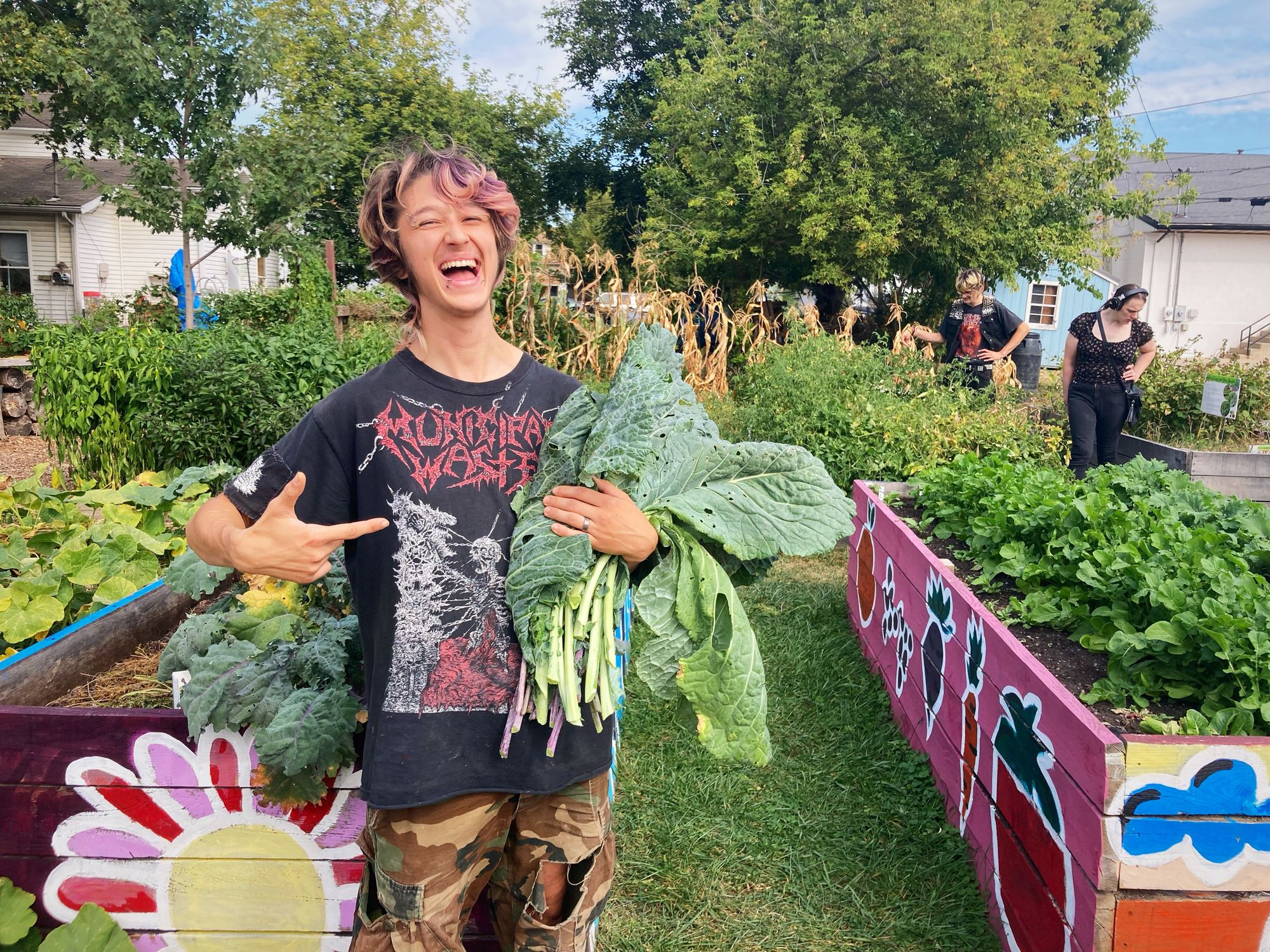
In recent years, the Walkers have partnered with Bloomingdale Elementary School to open the garden to class tours and planting sessions. In 2021, Mr. Dunton’s third grade class began growing flowers and vegetables from seed in his classroom to donate to the garden or residents.
Since then, more classes have started growing plants in the late-winter months to help the neighborhood prepare for spring. This led Bloomingdale to partner with Amp Lab at Electric Works to troubleshoot challenges in the process, like watering plants while the elementary students are on break.
Walker submitted a proposal to Amp Lab’s Think Tank Pool, which engages Fort Wayne Community Schools juniors and seniors in real-world, project-based learning challenges. As a result, STEAM Skills Teacher Deanna Casiano at Amp Lab led two project teams of students to assist Bloomingdale: One that worked with elementary schoolers on how to plant and grow seeds, and one that engineered self-watering systems for the seedlings.
“The end result was two very different watering systems that kept the plants alive during long breaks,” Walker says.
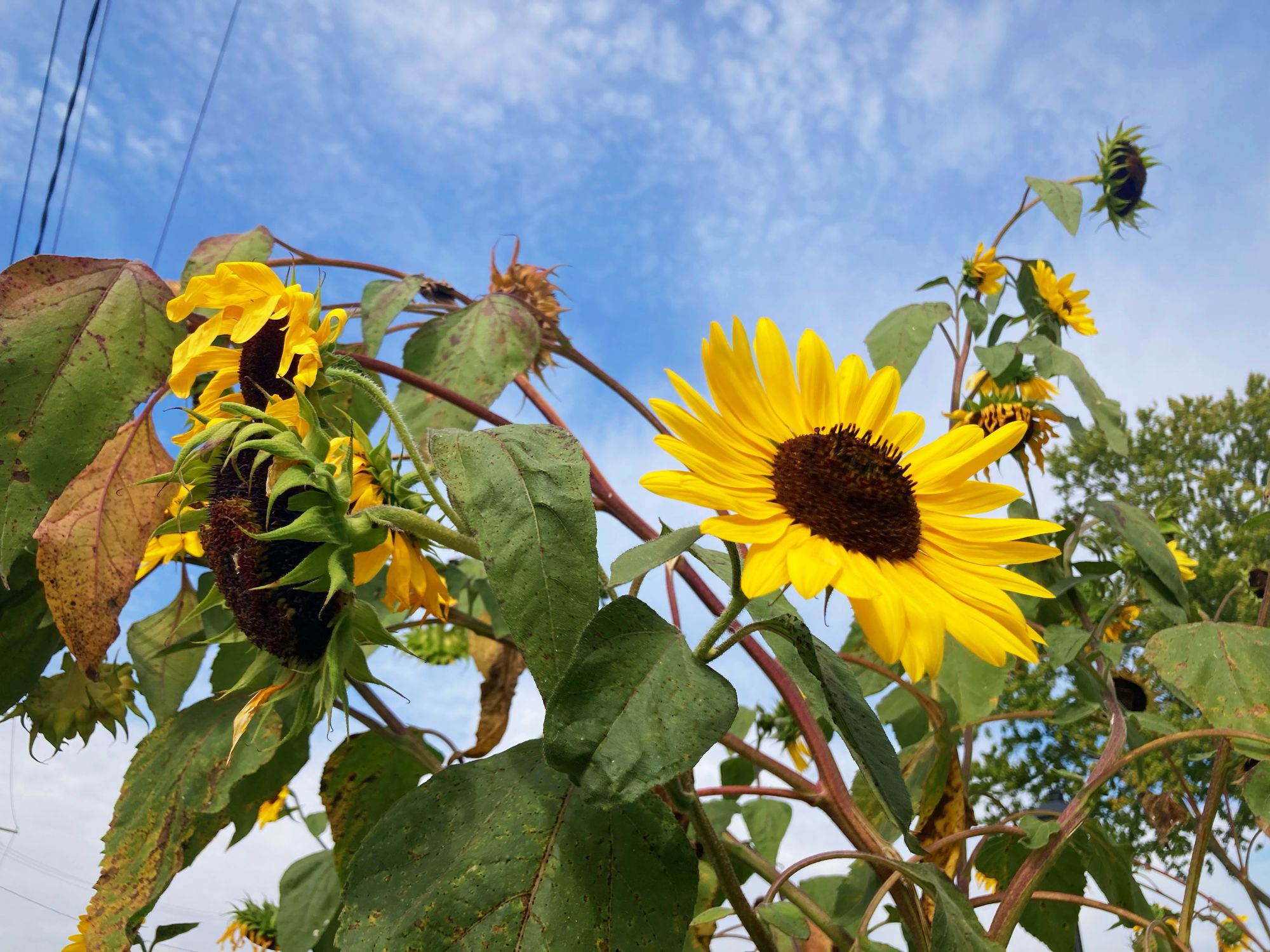
Bloomingdale isn’t the only neighborhood where community gardens are feeding residents and curious young minds alike. In the Poplar neighborhood, just south of Downtown near Electric Works, gold-certified Master Gardener Diana Hart runs the sprawling Poplar Village Gardens on about three-acres of land at the corner of Walnut and Miner streets.
Hart purchased the property, where her house sits, 33 years ago in 1990. At the time, she was working as a caseworker for the Allen County Division of Family and Children's Services and felt called to serve local families in more proactive ways. So she started a small childcare center out of her home in 1993, where she began working with about 12 children ages 0-4 and in elementary school, using a curriculum focused on environmental stewardship sustainability.
“We teach the children about composting, reusing, and consumer-driven need,” Hart says. “We have high-level conversations, which I know go over their heads sometimes, but I feel like I need to plant the seed.”
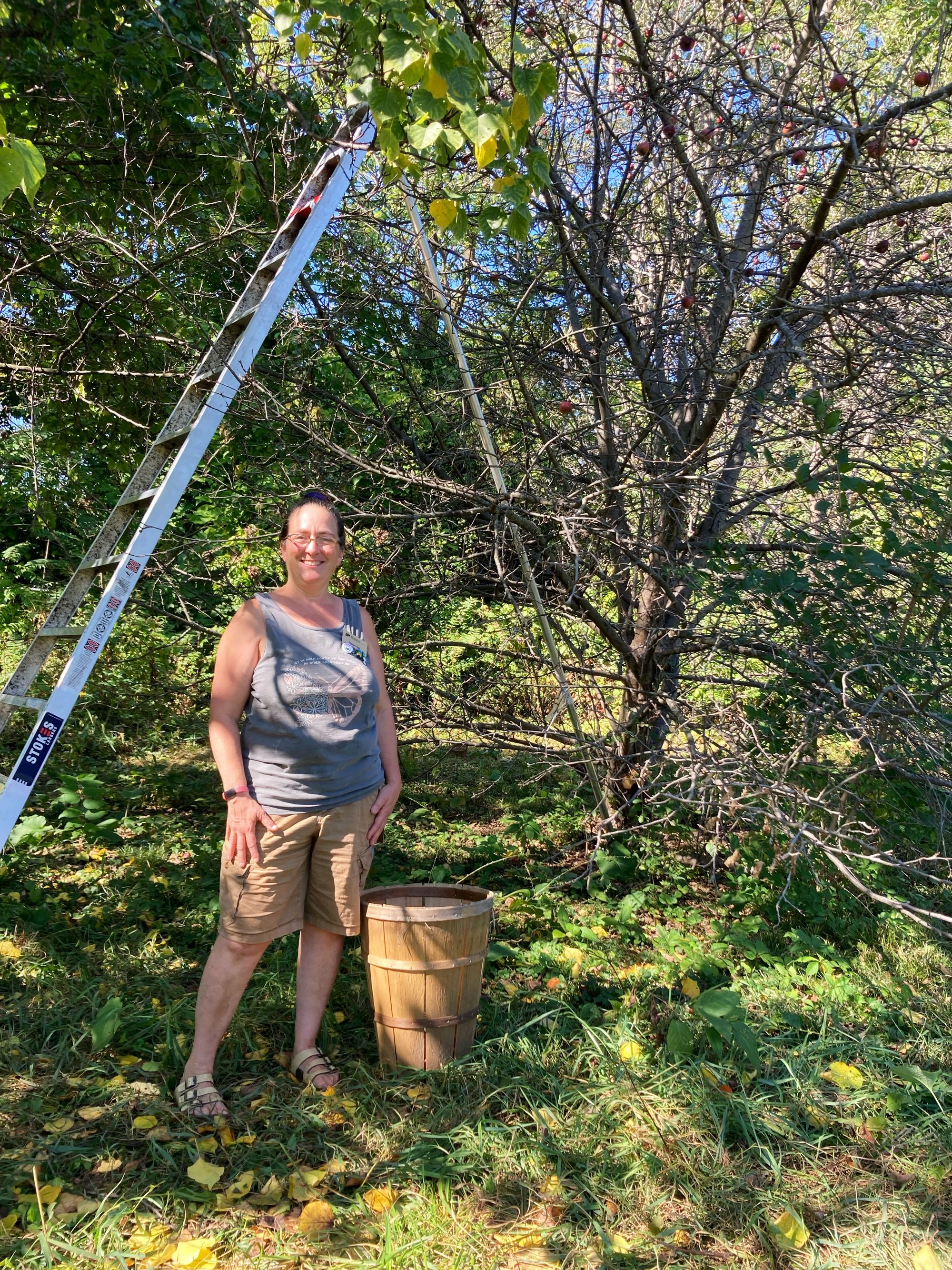
Over the years, her desire to teach children about sustainability germinated into real seeds, plants and trees on her property. She planted a few fruit trees – apples, pears and apricots – about 20 years ago on a whim, and in 2019, she began using these trees and additional fruit, vegetable, and pollinator plants to teach her daycare students about permaculture, a self-sustaining gardening method that mimics nature with a focus on preserving native species.
“It’s a system where the plants we put into each guild serve a purpose for the other plants already there,” Hart says. “We try to ensure that problems within the system can be solved by incorporating other parts of the system itself, so nothing goes to waste because the waste material of one process is utilized by another.”
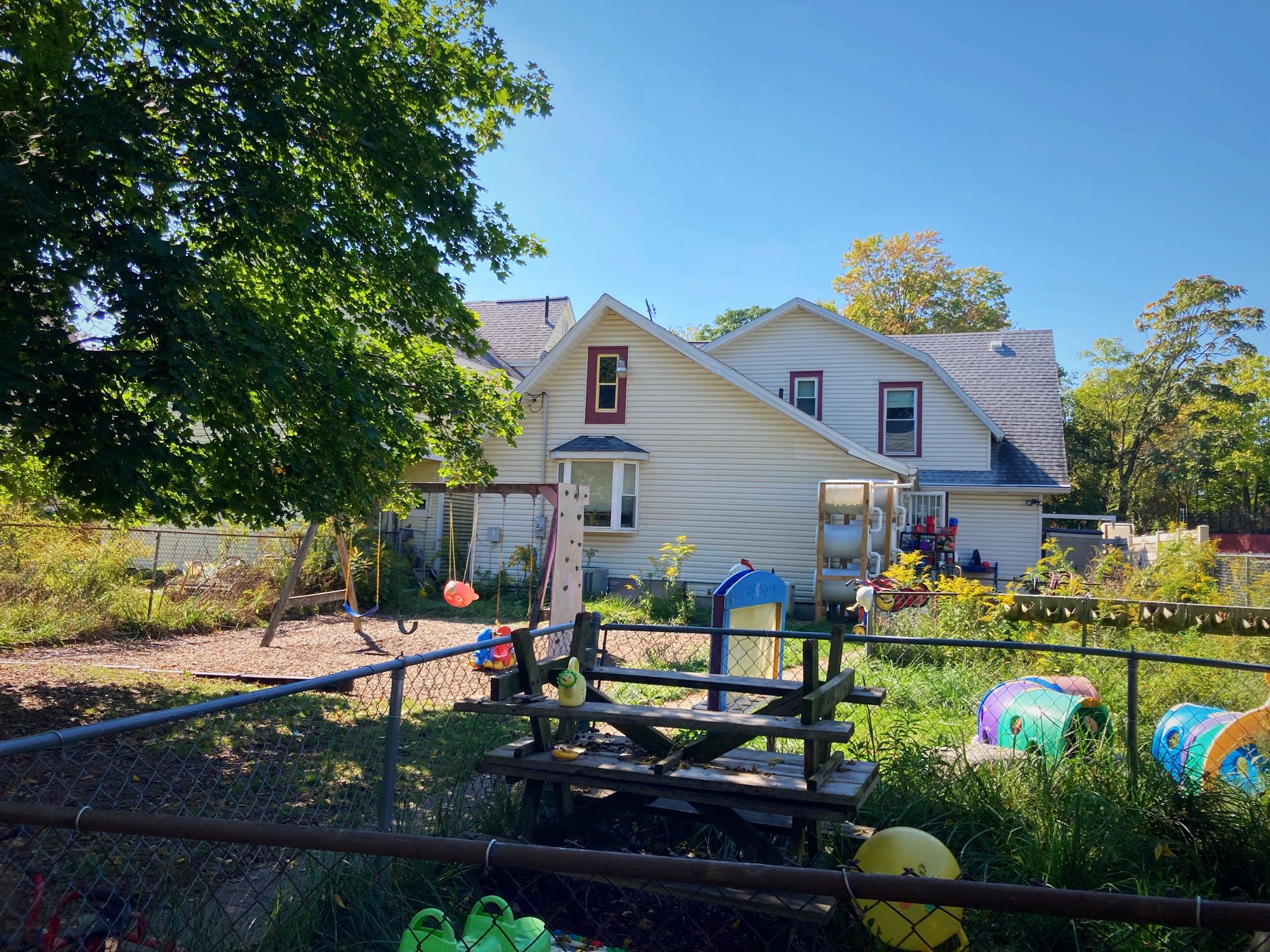
In the summer of 2020, Hart opened her garden to the public and volunteers, enabling her to assist area food pantries in the wake of the COVID-19 pandemic. That first year, Poplar Village Gardens grew and donated more than 1,300 pounds of food to Saint Patrick’s Food Bank.
Now, it’s donating to Miss Virginia’s Food Pantry at 1312 S. Hanna St.
“Everything we grow here, we try to put back into the community, which is very much in line with the concept of permaculture, too,” Hart says. “Our mission statement is: ‘Building community while growing food together,’ and I’ve met more of my neighbors in the past three to four years doing this than I have the entire 30-some years I’ve lived here because we’ve made this space open and inviting to the public."
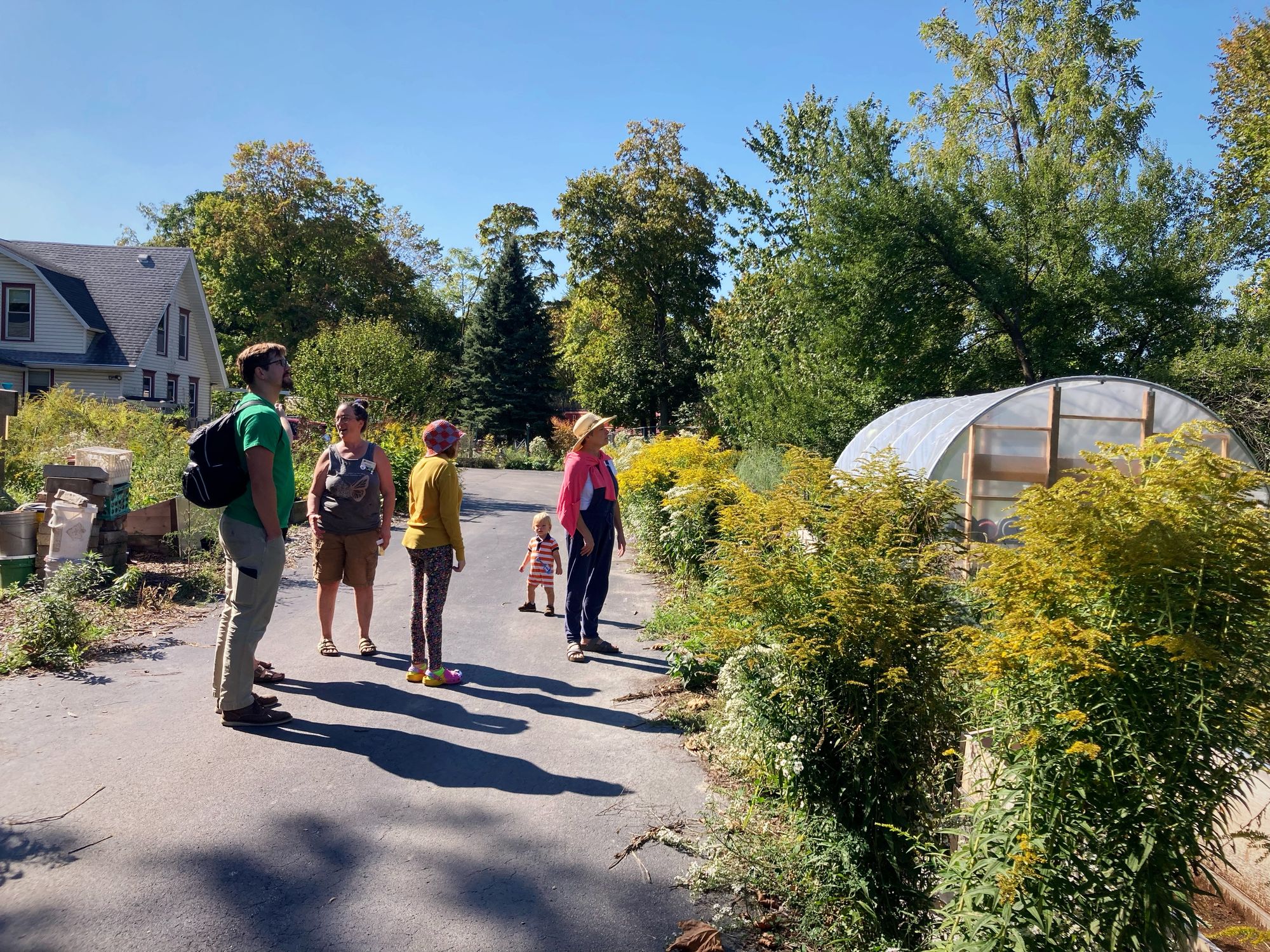
While food in the garden is free, and Hart is always accepting volunteers, she encourages anyone interested to contact her first.
“Because we are doing things in a nontraditional way, we like for everyone harvesting or working in the garden to work with a gardener or a seasoned volunteer, so we can make the best use of what we have,” Hart says.
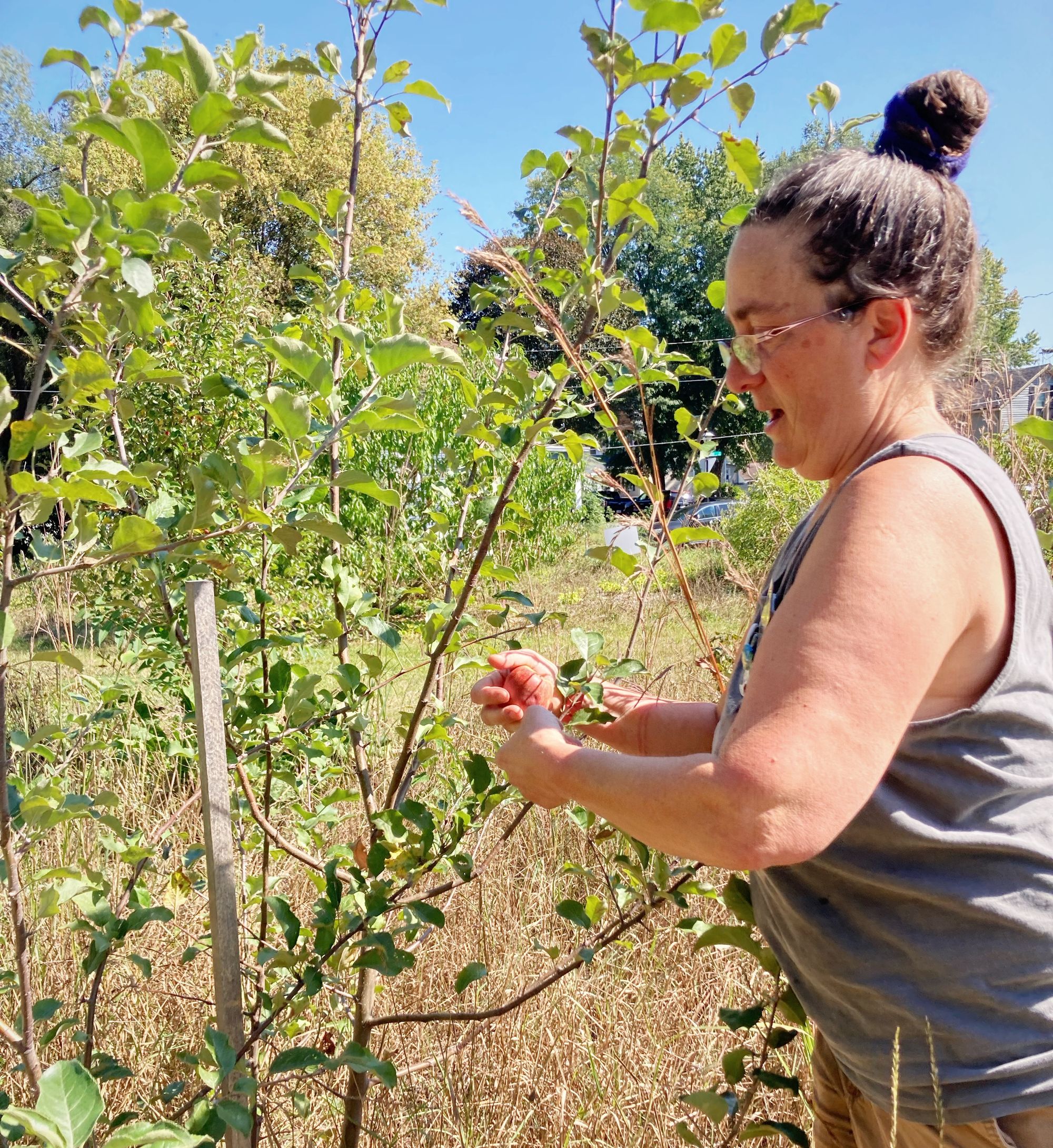
During a recent volunteer day in early October, nearby resident and gardener Maverick Maley was assisting Hart with apple picking for Miss Virginia’s Food Pantry. He and a few friends heard about the garden through the graffiti-art organization Fort Wayne Open Walls, which Hart began partnering with a few years ago to paint a blank cement wall on her property.
“Our cool factor with the neighborhood kids definitely went up when we started having paint on the wall,” Hart says.
In recent years, Hart has added benches to the garden, too. She encourages anyone to stroll the property with their pets and bask in the natural wonderland the garden has created.
“Everything is here, not just for us, as people, but also for the animals and the pollinators, which benefit all parts of the system,” Hart says. “In the past four years, I’ve seen a huge increase in the variety of pollinators here. When you look at the plants, you can see how alive they are.”
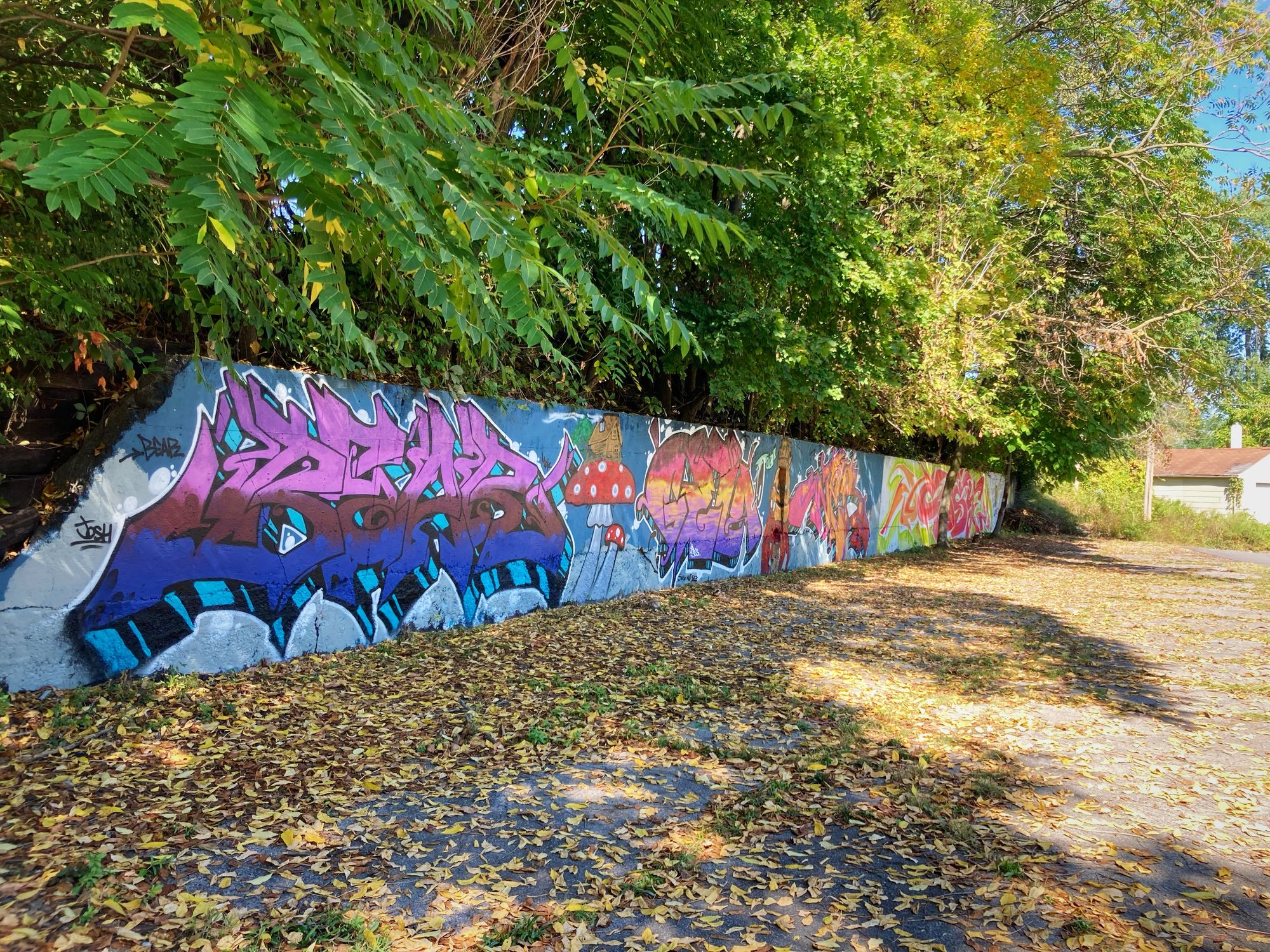
In the future, she’d like to raise additional funds for the garden, which currently comes out of her daycare budget. She’d also like to increase her number of volunteers, so she can grow more food and plant additional properties she owns nearby.
“There’s a lot to do, but I try not to worry about it because we are a small operation, and we have to keep building it,” Hart says.
In the meantime, Poplar Village Gardens also has a mutual-aid community food pantry on site, providing residents with free packaged or canned goods.
In Bloomingdale, Walker says students, area business owners and volunteers have gone above and beyond to support the garden and beautify it, painting its planter boxes and food pantry. He says young residents are some of the neighborhood’s most active volunteers, and while they might not own property there, they rent homes or retail space. In fact, about 47 percent of homes in Bloomingdale are rentals.
As a result, he’s making a move at his November neighborhood association meeting to allow renters to become voting members of the association, which has been limited to property owners in the past.
“That will hopefully help with participation in our neighborhood, especially among the younger demographic,” Walker says. “Students and young adults might not have money to give, but they are willing to invest their time.”
Ultimately, the seeds planted in Fort Wayne’s neighborhood gardens are growing more sustainable and connected communities in many ways.
